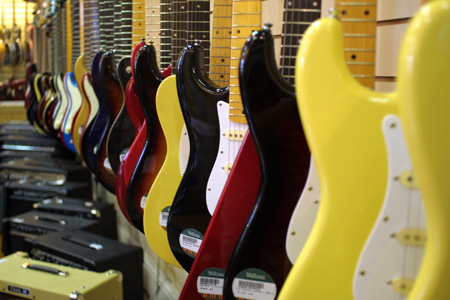|
Guitar Maintenance - Cleaning
General Cleaning There is more to guitar maintenance than a simple change of guitar strings. Cleaning of the whole instrument, the body, neck/fretboard and parts should be done on a regular basis to keep the guitar in tip-top condition. A well set up and cleaned guitar makes playing a pleasure. If you ever feel your playing is a little lack luster, or you just need a bit of motivation, then restringing and cleaning the instrument will give it, and your playing a new lease of life. To clean the guitar use a lint free cloth** and either an oil, a cream, or even a spray suitable for a guitar finish (on the body) and neck. Try and avoid products that contain silicone as this can cause problems if future repairs to finish are required. Traditionally bare ebony or rosewood fretboards would have been dressed by rubbing in a small amount of lemon oil or linseed oil, buffed off using a dry cloth. If using a spray it is advisable to spray onto the cloth rather than directly onto the guitar. My personal choice for cleaning the guitar is an oil, Dr Ducks AxWax and String Lube, an all-in-one cleaner for the body, fretboard and strings. However, look out out for products by Ernie Ball, Planet Waves, Dunlop, Martin and Fender.
I remember working in a guitar store, it was the first job I had after leaving school and I loved it. And that is despite the fact that every morning I had to clean two floors of guitars. And now every-time I smell that polish it brings back great memories! TIP: A little tip I found useful when cleaning all those guitars was to use a bristle paint brush to get to those awkward parts of the guitar, like under the strings at the headstock and body, and the bridge. This will do for a weekly cleaning session (if you can be bothered!). But for a guitar that needs more of a deep clean, to remove built up gunk of all sorts, or whenever you change strings, you will need to do something a little different. And when it is time to change guitar strings, polishing/deep cleaning the fretboard should really also be done, preferably do this on a monthly basis. You can use the same cleaning products but a bit more elbow grease will be required with perhaps some very fine steel wool or a special cloth for polishing the frets like the Jim Dunlop Fret Polishing Cloth. The steel wool needs to be of a very fine 0000 grade but ONLY use this on a rosewood or ebony fretboard, using this on a polished maple board will damage the finish. You may find that the build up of grime is pretty bad along the length of the frets, running across the fretboard. There are a few methods for getting rid of this including using a craft blade or, again, fine steel wool. My personal tool of choice is an old toothbrush, which also work well for cleaning the bridge and saddles (using a little naphtha). Please note, I did say OLD toothbrush!! Toothbrush and guitar maintenance! Did you ever think you would hear those words in the same sentence? Temperature and Storage As far as guitar maintenance is concerned, temperature and humidity are the greatest enemies whether acoustic or electric. Hot, dry, cold or damp conditions will all have an effect of the guitars finish and electrics, causing cracks, warping, softening of glues and a host of other nasties. Keeping your guitar in a comfortable room temperature and humidity is ideal, but DO NOT leave the guitar propped up against a radiator or close to any other heat source, that's bad news! Other enemies of your guitar are leaving it in the car, in direct sunlight or where it can have something spilled on it, and areas of high moisture. Try not to take it into the shower with you, that is also bad! It is best practice to always return the guitar to its case after you have finished playing it, although I have to say for a few of my guitars, that just does not happen. My main gigging instruments, yes, but I have a couple of day to day instruments that I have propped up on stands so that I can grab them and play whenever I get any opportunity.
If the guitar is to be stored for longer period of time keep it in the best quality case you can afford with a humidifier bag (like silica gel) inside, and away from direct sunlight and all the other nasty things mentioned above. And loosen the strings in order to relieve the tension. ** Incidentally, a lint free cloth is generally recognised as one that does not contain flax or cotton. They're the kind of cloth used to remove nail varnish. Examples would be computer screen wipes or even baby wipes. Just let a few of the wipes dry out and you have yourself a lint free cloth. Stay away from those yellow, cotton cleaning cloths. They just leave fluff balls attached to your strings when you wipe them, deadening the sound. Look out for further articles on guitar maintenance and repair by signing up for the newsletter and RSS feeds. And don't forget you can check the RSS feeds or even view the site from your mobile phone if it is web enabled!
Back From - Guitar Maintenance
|
